Animals
Artwork Khrushchev Probably Would Not Have Liked 40
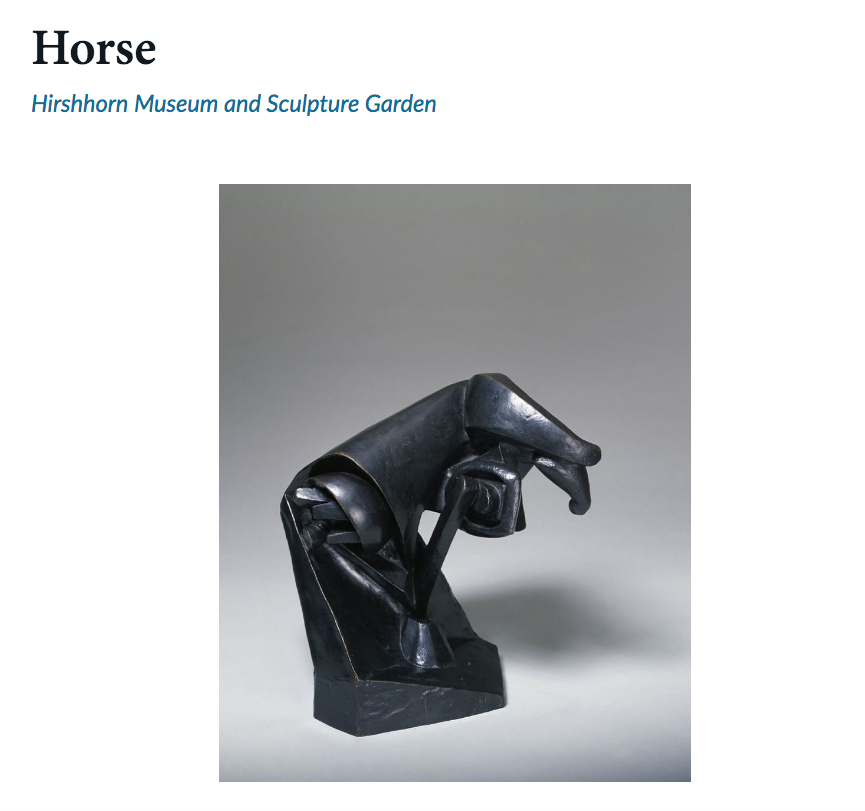
Raymond Duchamp-Villon.
His Wikipedia page.
Sculpture page.
Posted By: Paul - Wed Dec 08, 2021 -
Comments (2)
Category: Animals, Avant Garde, Statues and Monuments, Nineteenth Century, Twentieth Century
A History of Mechanical Horses
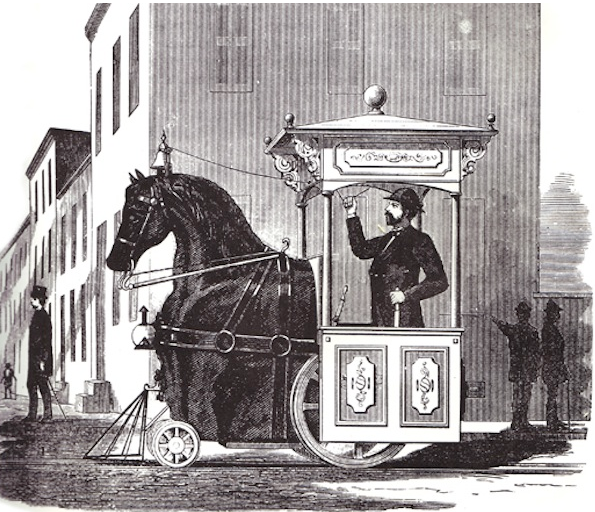
Read the piece here.
There should be a separate article on mechanical horses in literature. My favorite one occurs in these two novels by Roger Zelazny.
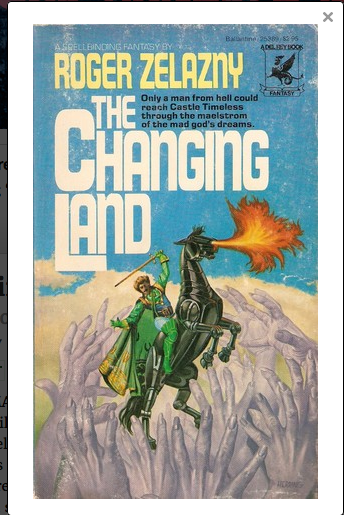
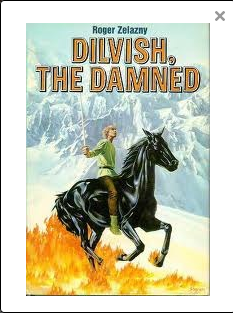
Posted By: Paul - Tue Nov 30, 2021 -
Comments (1)
Category: Animals, Inventions, Literature, Fantasy, AI, Robots and Other Automatons, Nineteenth Century, Twentieth Century
The King Kong Show (and Tom of T.H.U.M.B.)
Wikipedia page here.
Posted By: Paul - Mon Nov 08, 2021 -
Comments (0)
Category: Animals, Ineptness, Crudity, Talentlessness, Kitsch, and Bad Art, Cartoons, 1960s
The Farm Art of Jens ‘Art’ Morrison
Jens 'Art' Morrison, of Cedar Rapids, Iowa, was a practitioner of 'farm art'. Or, as he put it, he was a 'farmicist'. He mostly worked in ceramics and was most active during the 1970s and '80s.By 'farm art' he meant that a) farm animals were a recurring theme throughout his work, and b) there was a heavy emphasis on quirky, folk humor in his work, as well as A LOT of bad puns (see 'farmicist'). So, 'farm art' was deliberately distinct from 'serious art'.
One of his creations was 'Juxtapachickens.' This was a series of fourteen-inch ceramic chickens. (The url juxtapachicken.com leads to a site that consists solely of a picture of two skinned chickens in a pot. I have no idea if this was somehow inspired by or related to Morrison's work. I'm guessing not.)
Far more elaborate was his "artillogical" discovery of the "Farmounians," who he claimed were the ancient, original settlers of Iowa. As he put it:

He created (or 'discovered') numerous artifacts of these Farmounians, such as 'corntainers' that displayed ancient-looking ceramic reliefs he called 'Pigtaglyphs'. He said he was just providing 'infarmation' about this ancient culture.

Morrison even wrote a book about the Farmounians — A History of Farmounia. He described it as a 'Historical Gehography'. It's an obscure work, but there's a copy available on abebooks for $33.66 (plus $34 shipping from the UK to US).

Posted By: Alex - Tue Oct 12, 2021 -
Comments (2)
Category: Animals, Farming, Art
A Moose for Jessica
In 1987, a wild moose fell in love with what zoologists refer to as a "biologically inappropriate object". His love interest was a cow named Jessica who lived on the Vermont farm of Larry Carrara.For over two months the moose displayed courtship behavior towards Jessica. He followed her all around, would rest his head on her back, or would push hay toward her as a food offering.
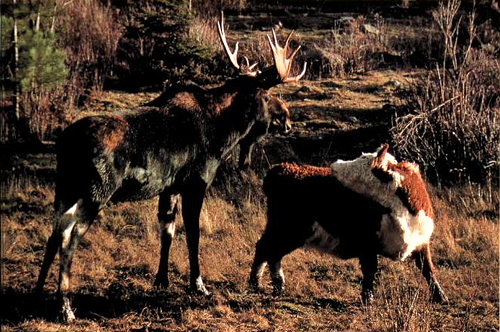
The moose and Jessica
Over 75,000 sightseers came out to Carrara's farm to witness this interspecies romance.
Finally, after 76 days, rutting season came to an end and the moose lost interest in Jessica and wandered back into the wild.
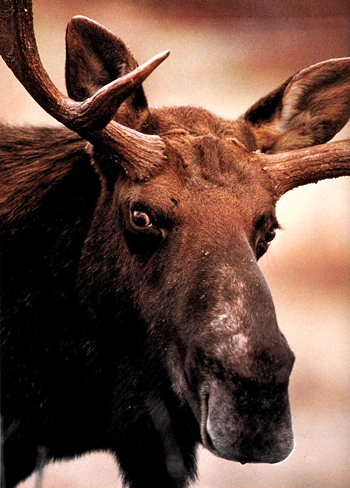
The moose
The romance between the moose and Jessica inspired the book A Moose for Jessica, written by Pat Wakefield with photographs by Larry Carrara. It's available on Amazon, or you can read it for free at archive.org.
More info: wikipedia, New England Living
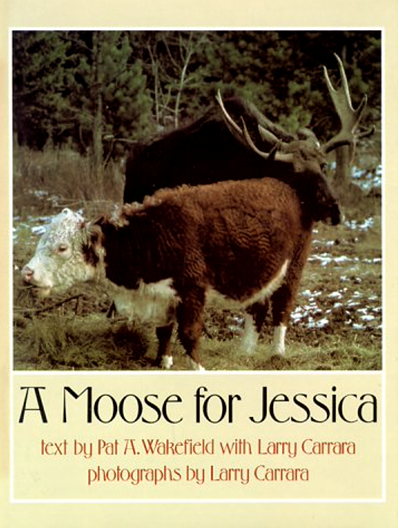
Posted By: Alex - Sun Oct 10, 2021 -
Comments (0)
Category: Animals, Cows, Books, 1980s, Love & Romance
Gee Geronimo the Snail
I'm not aware of many famous snails. Gee Geronimo, as far as I know, may be the only one. Back in the 1970s, the Guinness Book of Records declared him to be the world's biggest snail. His owner was Christopher Hudson. Gee Geronimo died in 1976.
Christopher Hudson with Gee Geronimo
source: 1978 Guinness Book of Records

Connellsville Daily Courier - Nov 27, 1976
Hudson was apparently more in love with his snails than he was with his wife.

Honolulu Advertiser - Feb 4, 1977
Posted By: Alex - Wed Sep 15, 2021 -
Comments (4)
Category: Animals, World Records, Marriage, 1970s
The Attack-Trained Iguanas of Irenee du Pont
Irénée du Pont was president of the Du Pont Company from 1919 to 1925, and remained on its board of directors until 1958.He built a mansion named Xanadu down in Cuba, where he trained iguanas to attack and kill on his command. Details from Du Pont Dynasty: Behind the Nylon Curtain by Gerard Colby:

"Irénée du Pont, 80, bends to pat an iguana on his Cuban estate where many of these lizards wander. He feeds them papaya from jar he holds"
Life - Aug 19, 1957
Posted By: Alex - Wed Sep 08, 2021 -
Comments (5)
Category: Animals, Eccentrics
Crocodile Teasing at the Sriracha Tiger Zoo
The head in mouth bit comes after the four-minute mark.The Wikipedia page.
Posted By: Paul - Thu Aug 26, 2021 -
Comments (0)
Category: Animals, Death, Fairs, Amusement Parks, and Resorts, Asia
1965 Vogue Lingerie Feature
To see larger images of every page, go to link.CAUTION: NSFW pop-ups might intervene!

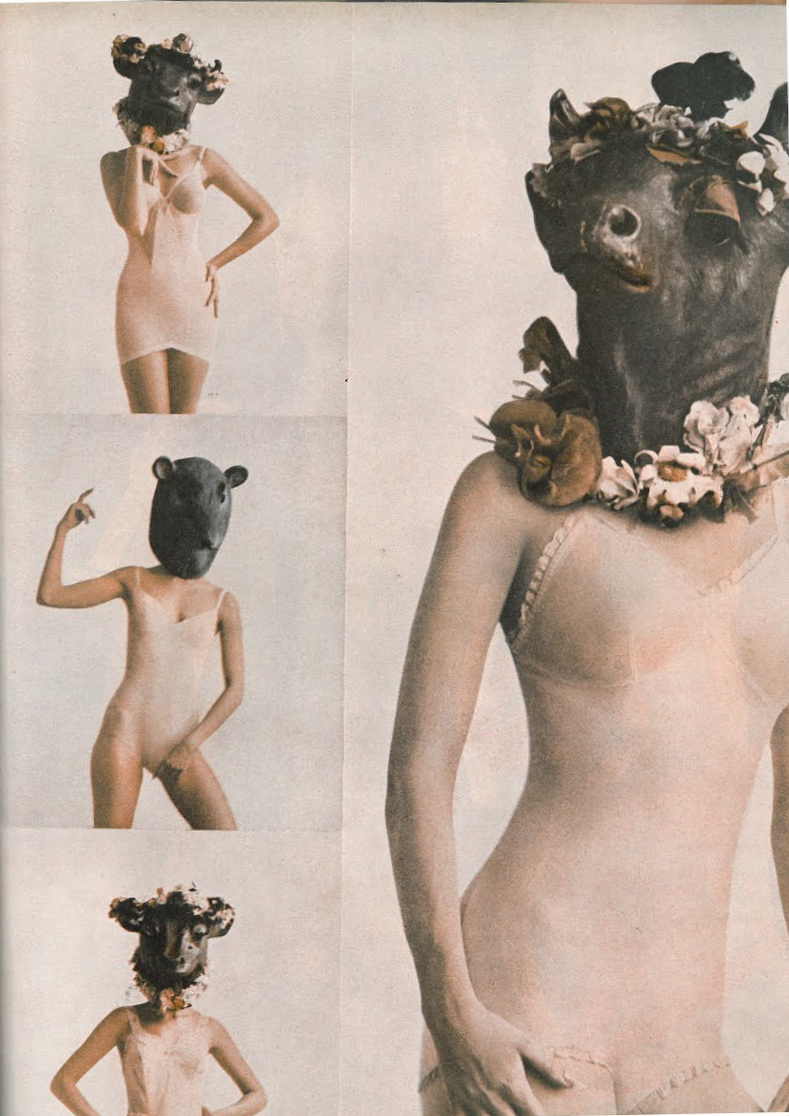
Posted By: Paul - Fri Aug 13, 2021 -
Comments (0)
Category: Animals, Anthropomorphism, Fashion, Underwear, Surrealism, 1960s
Madeleine Ravier’s Bicycle for Animals
Humans have invented mechanical devices, such as bicycles, that allow us to move faster by amplifying the power of our limbs. Madeleine Ravier of Paris argued that what works for people should also work for animals. So she invented and, in 1907, patented a "Cycles pour animaux," or 'bicycle for animals'.Her patent is in French, but the automatic translation is fairly comprehensible. Here's part of it.
Quite recently (less than 50 years ago), understanding the imperfection of his own limbs, he endowed them with mobile mechanisms, he put cycles, devices formed of 2 or 3 wheels between the legs. and of a few light and simple organs, with which he has prodigiously increased the extent of his movements without the help of external energy.
He thus achieved 370 kilometers in 12 hours (cyclist Cadolle), and even 45,764 kilometers (record of cyclist Bouhours), while excellent athletes, on their limbs, did not achieve, at most, at the same time of 12 hours than the already very high distances of 113 kilometers (walker 5o Hibbird) or ikh kilometers (rowell runner)....
What man did for himself he can do it for animals, or at least for some of them; There is a way to increase the efficiency of their limbs by the intercalation, between these limbs and the field of motion, of mechanical devices receiving the reciprocating motion of the limbs, transforming it into continuous rotary motion, and ending in rotating parts; and the result obtained can be used to make animals move man faster and farther than has hitherto been done by using them.
Ravier imagined making bicycles for all kinds of animals including "mules, donkeys, elephants, camels, dromedaries, etc.". But she started with a bicycle for horses, as shown below.

I have no idea if she ever built and tested one of these horse bicycles. The language barrier makes researching this a challenge.
Posted By: Alex - Sun Aug 08, 2021 -
Comments (5)
Category: Animals, Bicycles and Other Human-powered Vehicles, Inventions, Patents, 1900s

| Who We Are |
|---|
| Alex Boese Alex is the creator and curator of the Museum of Hoaxes. He's also the author of various weird, non-fiction, science-themed books such as Elephants on Acid and Psychedelic Apes. Paul Di Filippo Paul has been paid to put weird ideas into fictional form for over thirty years, in his career as a noted science fiction writer. He has recently begun blogging on many curious topics with three fellow writers at The Inferior 4+1. Contact Us |




